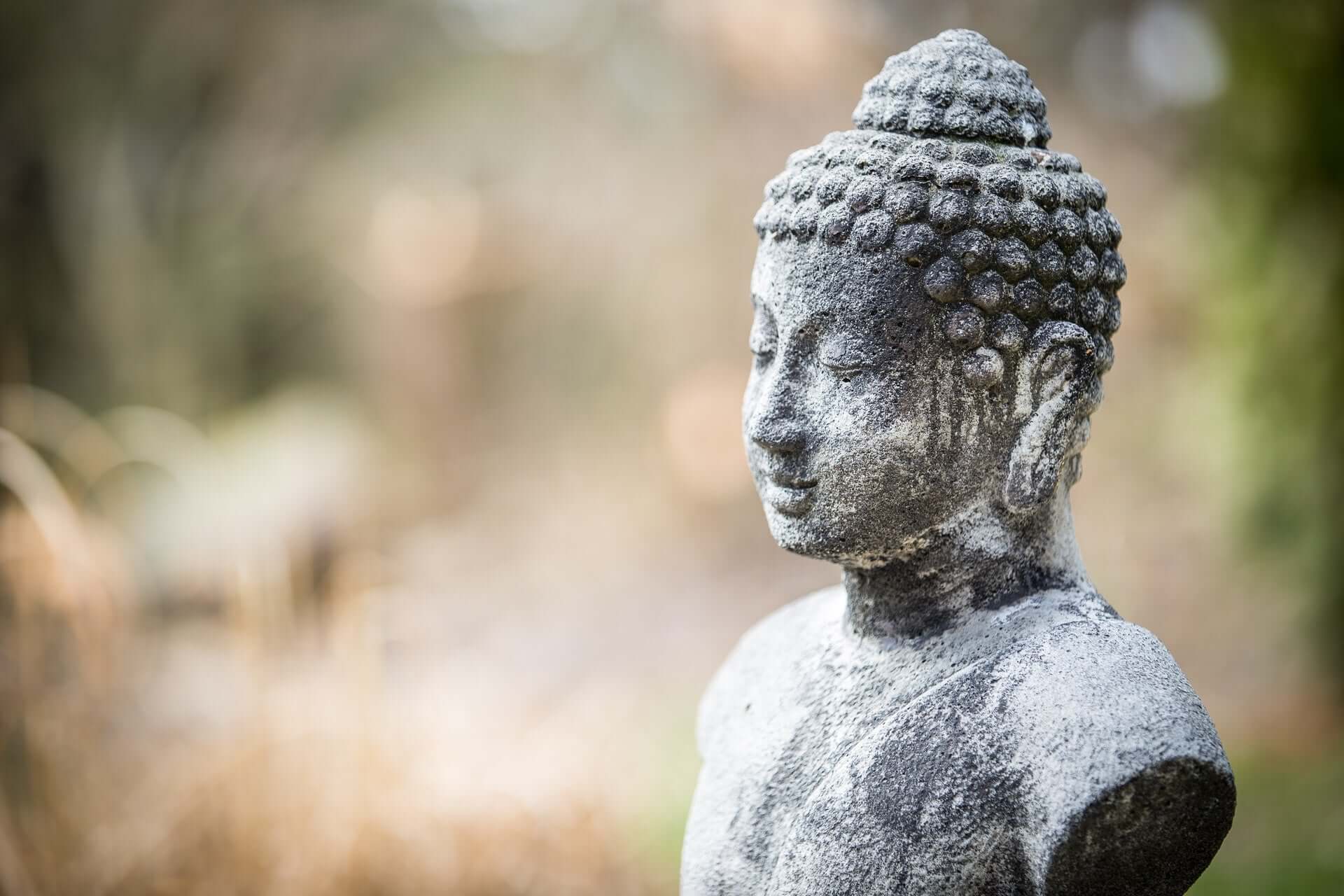
Inhaltsverzeichnis
Zen – Was bedeutet das eigentlich?
Das Wörtchen “Zen” ist uns allen mit Sicherheit schon einmal begegnet. Es gibt Zen-Gärten, den Zen-Buddhismus, und zudem wird “Zen” auch als eine Art Ruhezustand verstanden. Was aber verbirgt sich eigentlich hinter dem Begriff? Ich habe ein paar Nachforschungen angestellt und wurde überrascht…
Ein Wink des Universums?
In meinem Lieblings-Buchladen fiel mir vor kurzem ein Buch in die Hände, welches ich, einmal angesehen, nicht mehr weglegen konnte. Es ist recht klein, auf dem Cover ist eine Illustration in Blautönen zu sehen, auf der eine Frau am Ufer eines Sees sitzt. Im Hintergrund ist der Mount Fuji zu sehen. Das Buch trägt den Namen “Zen – The Art of Simple Living” (dt. etwa “Zen – Die Kunst des simplen Lebens”), der Autor heißt Shunmyo Masuno. Ein Blick auf den Klappentext verrät, dass in diesem Buch 100 Praktiken und Lehren des Zen-Buddhismus vermittelt werden sollen, die sich leicht auf den Alltag übertragen lassen und zu mehr Zufriedenheit führen wollen. Spätestens nachdem ich kurz durch das Büchlein blätterte und total angetan war von den wunderschönen kleinen Illustrationen im Innern, stand für mich fest: “Das muss ich mitnehmen!”
Warum ich das erzähle?
Beim Lesen des Vorworts fiel mir auf, dass ich zwar eine grobe Vorstellung davon habe, worum es beim Zen geht, mir aber noch nie ernsthaft Gedanken darüber gemacht habe, was Zen überhaupt bedeuten soll. Ich war angefixt und recherchierte ein wenig. Weil ich mir denke, dass ich damit bestimmt nicht alleine bin, und es schade wäre, mein in Erfahrung gebrachtes Wissen nicht fest zu halten, teile ich es nun hier in diesem Beitrag mit dir.

Wofür steht “Zen”?
Zen geht auf das Sanskritwort Dhyana zurück, welches so viel wie “Zustand meditativer Versenkung” bedeutet. Es verbreitete sich zunächst im 5. Jahrhundert als eine Strömung des Buddhismus in China, hat also schon eine sehr lange Tradition. Bald entwickelten sich auch eine koreanische sowie eine vietnamesische Auslegung. Das, was wir jedoch heute hauptsächlich unter Zen verstehen, geht auf die japanische Ausprägung von Zen zurück. Diese entwickelte sich erst später, im 12. Jahrhundert. So viel zum begrifflichen und geschichtlichen Hintergrund des Wortes.
Wir können also festhalten, dass Zen keine einheitliche “Lehre” ist, sondern in verschiedenen Versionen existiert. Auch hat Zen zwar Wurzeln im Buddhismus; es ist aber nicht als religiöse Strömung zu verstehen und kann damit von jedem Menschen erfahren werden, der sich damit auseinandersetzt.
Häufig wird gesagt, dass hinter Zen keine wirkliche Lehre stehe. Auch besondere Weisheiten beinhalte Zen nicht. Ganz im Gegenteil biete Zen im Endeffekt “nichts". Was soll das bedeuten? Hat Zen also eigentlich gar keine Aussage?
Doch, klar! Denn diese Auffassung passt sehr gut zu unserem heutigen Verständnis von Meditation, dem “Nichts-Tun”.
Womit wir bei einem zentralen Punkt des Zen wären:
Wie wird Zen praktiziert?
Die Sitzmeditation, hier “Zazen” genannt, ist eine der zentralen Praktiken im Zen. Der japanische Begriff Zazen bedeutet so viel wie “Sitzen in Versunkenheit”. Typisch dabei ist die Sitzhaltung: Ineinander geschlagene Beine, ein aufrechter Rücken, halb geöffnete Augen und sich im Schoß sanft berührende Daumen. Eben genau so, wie wir es von dekorativen Buddhastatuen kennen. Aber auch hier gibt es natürlich einige Abwandlungen dieser Position.
Bei der Sitzmeditation geht es nicht darum, eine Erleuchtung zu haben (die es im Zen aber auch geben kann). Vielmehr soll die Konzentration auf die Gegenwart gewendet werden, ohne dabei irgendwelchen Gedanken nach zu gehen. Der Geist soll Ruhe finden. Im Zen glaubt man, dass die Überwindung des “Ich-Bewusstseins” zurück zu unserer ursprünglichen Natur und damit zu unserem “normalen Zustand” führt. Damit soll sich die Sitzmeditation positiv auf Geist und Körper auswirken.
Aber auch die Konzentration auf den Alltag spielt eine große Rolle in der Zen-Praxis. Nicht nur in der Meditation soll der Geist zur Ruhe kommen. Auch im Alltag soll die “Gedankenflut” eingedämmt werden, und zwar durch vollkommene Konzentration auf die Aktivitäten, die man im jeweiligen Moment ausführt.
Worum geht es bei Zen, was ist das Ziel?
Zen soll eine neue Perspektive auf sich selbst, den Alltag und auf die Welt ermöglichen. Das gelingt durch das Präsent-Sein im gegenwärtigen Augenblick. Die manchmal plötzlich eintretende Erleben von universeller Einheit wird gelegentlich auch als “Erleuchtung” oder “Buddha-Werden” bezeichnet, auch wenn das nicht das Ziel des Zen ist.
Im Grunde geht es also darum, über das gewöhnliche, kategorisierende Denken hinaus zu gehen, ins “Nicht-Denken”.
Masuno schreibt in dem zu Beginn erwähnten Buch (frei übersetzt aus dem Englischen): “Zen gibt Anregungen und Hinweise zu Gewohnheiten und Ideen rund um ein glückliches Leben”. Ferner spielen vier Sätze im Zen eine zentrale Rolle: Das spirituelle Erwachen wird außerhalb einer Lehre vermittelt, es kann nicht durch Wörter oder Texte vermittelt werden, Zen richtet sich direkt an den menschlichen Geist und Zen ermöglicht es einem, zur eigenen, ursprünglichen Natur zurück zu kehren. Einfacher ausgedrückt: Es geht nicht darum, sich an Schriften oder das gelehrte Wort zu halten, sondern vielmehr darum, sich selbst im Hier und Jetzt zu begegnen, so wie man ist. Laut Masuno besteht der “Zen style” darin, ein unglaublich simples Leben zu leben, befreit von sinnlosen Dingen, von unnötigen Sorgen und ohne den Einfluss der Werte von anderen Menschen: “The answers you seek are within”. 😌
Wenn du noch mehr über Achtsamkeit, gesunde Ernährung, Nachhaltigkeit oder Familie und Schwangerschaft erfahren möchtest, schaue dir hier noch mehr spannende Blog-Artikel zu diesen Themen an.

Photo by Faye Cornish on Unsplash



























3 Comments
und ich las: Zen wanderte – blieb stehen, nahm eine Sandale von seinem Fuß, legte sie auf seinen Kopf und wanderte weiter seines Weges.
H.K.-U. de Stelter z.H.
Ein interessanter Beitrag mit leicht verständlicher Erklärung, sehr anschaulich gemacht!
Das Seiende ist in unserem Geist; Interesse heißt: außerhalb des Seins – inter Esse.
Jörg Hildebrandt
Spannend! Vielen Dank :)
Ma
Leave a comment
This site is protected by hCaptcha and the hCaptcha Privacy Policy and Terms of Service apply.